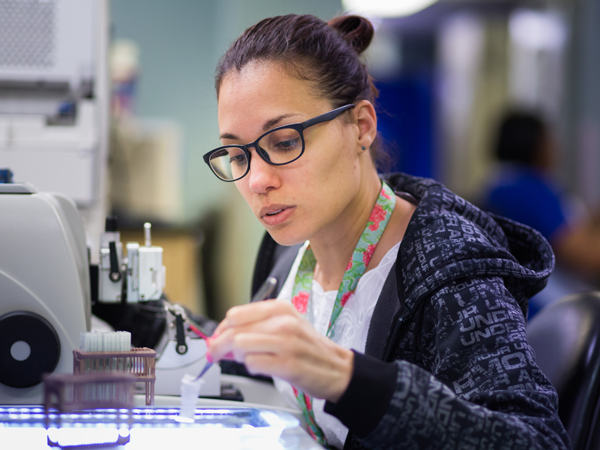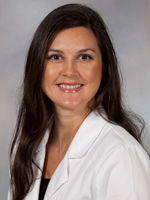National shortage spurs new histotechnology program in SHRP

Before the patient finds out if the mole they've been concerned about is benign or malignant—even before the pathologist steps up to the microscope to make that determination—the tissue sample undergoes a complicated process.
The specimen undergoes “fixation and infiltration” to prevent it from spoiling. It is then embedded in paraffin, sliced thin by a microtome and placed on a slide to be stained or treated with chemicals.
Every day, surgical specimens at the University of Mississippi Medical Center hospitals and clinics produce an average of 400 tissue samples for diagnosing disease. It's a histologist's job to process these specimens for pathology, and there is a national shortage in the field.
Samantha Claxton is a histotechnician in the anatomic pathology lab at UMMC. She said she was introduced to histology through her job as a phlebotomist.
“I found histology to be fascinating,” Claxton said. “It's a job that teaches patience and requires attention to detail. It's very rewarding.”
A new program in the Medical Laboratory Sciences department at the School of Health Related Professions will address the shortage locally. The Bachelor of Science in Histotechnology is now accepting applications and will enroll its first students for the 2017 fall semester.

Dr. Renee Wilkins, associate professor of medical laboratory sciences, is the director of the new program. Wilkins has been with UMMC since she graduated from what was then called the Clinical Laboratory Sciences program in 1999.
Wilkins said that the admission requirements for the new program will be similar to those for the MLS program.
“We have criteria set for admissions which include a lot of science courses: anatomy and physiology, chemistry and microbiology. The students will be very similar to our MLS students,” she said. “We are looking for students with a really strong science background.”
Wilkins said this profession will appeal to students who want to be in the medical field but who do not want to have direct patient contact. Histology graduates will not be limited to working in a hospital lab but may find positions in research labs, specialty clinics like dermatology and gastroenterology as well as in the plant and animal sciences.

Histologists are categorized as histotechnologists and histotechnicians. A histotechnician usually has an associate's degree and is certified at the technician level. Some histotechnicians receive on-the-job training. A histotechnologist has completed a baccalaureate degree in a nationally accredited program and has passed a national certification exam. Histotechnologists have a pay advantage and are also able to hold supervisory and quality control positions in the lab.
“Students who complete this program will qualify to take a certification at the histotechnologist level,” said Bevilyn Perkins, instructor of medical laboratory sciences and education coordinator for the new program.
Perkins received her bachelor's degree in health science from Alcorn State University then completed the cytotechnology bachelor's program at UMMC. She also holds a master's degree from Mississippi College.

“I have been in anatomical pathology since 1983. Everywhere I have been, there has been a shortage of histotechs—and a real shortage of histotechs who were also certified,” she said.
According to the National Accrediting Agency of Clinical Laboratory Sciences, or NAACLS, there are only nine accredited histotechnology programs in the United States, only one of which is in the southeast. UMMC hopes to raise that number to 10 by spring 2019.
Wilkins said the program has already begun the accreditation process. “We have already submitted the letter of intent and are working on the initial applications,” she said. “Our goal is to receive final accreditation approval by the time the first class graduates.”
This is good news for Kathy Shields, director of clinical and surgical laboratories at UMMC.

“I've been here at UMMC for almost two years, and I believe the department of histology has been using contract histotechnicians and histotechnologists for about three years,” she said. When histology techs are hired on contract from out-of-state, the extra expense of travel and housing often falls to the institution hiring them.
Shields has been working with Wilkins and her team to help develop the curriculum since the department of pathology first approached SHRP about the need.
She said that it is ideal to have the histotechnologists working at the Medical Center provide training to the students. Students who enroll in the Bachelor of Science in Histotechnology program will rotate through UMMC's anatomic pathology laboratory during the final semester.
“I hope that the majority of our graduates will find a place at the Medical Center,” Shields said. “But with the nationwide shortage of histotechnologists, if a position is not open here or if a student chooses to not work here, there are other large facilities in town and in the tri-county area that are hiring. The need will still be there far into the future.”
The application deadline has been extended until July 1. Students interested in beginning the program can find out more by visiting the website.


